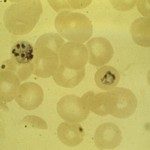Link to Pubmed [PMID] – 30002416
Link to DOI – 10.1038/s41598-018-28757-4
2018 Jul; 8(1): 10511
Plasmodium vivax merozoite invasion is restricted to Duffy positive reticulocytes. Merozoite interaction with the Duffy antigen is mediated by the P. vivax Duffy binding protein (PvDBP). The receptor-binding domain of PvDBP maps to an N-terminal cysteine-rich region referred to as region II (PvDBPII). In addition, a family of P. vivax reticulocyte binding proteins (PvRBPs) mediates interactions with reticulocyte receptors. The receptor binding domain of P. vivax reticulocyte binding protein 1a (PvRBP1a) maps to a 30 kD region (PvRBP1a30). Antibodies raised against recombinant PvRBP1a30 and PvDBPII recognize the native P. vivax antigens and inhibit their binding to host receptors. Rabbit IgG purified from sera raised against PvRBP1a30 and PvDBPII were tested individually and in combination for inhibition of reticulocyte invasion by P. vivax field isolates. While anti-PvDBPII rabbit IgG inhibits invasion, anti-PvRBP1a30 rabbit IgG does not show significant invasion inhibitory activity. Combining antibodies against PvDBPII and PvRBP1a30 also does not increase invasion inhibitory activity. These studies suggest that although PvRBP1a mediates reticulocyte invasion by P. vivax merozoites, it may not be useful to include PvRBP1a30 in a blood stage vaccine for P. vivax malaria. In contrast, these studies validate PvDBPII as a promising blood stage vaccine candidate for P. vivax malaria.




